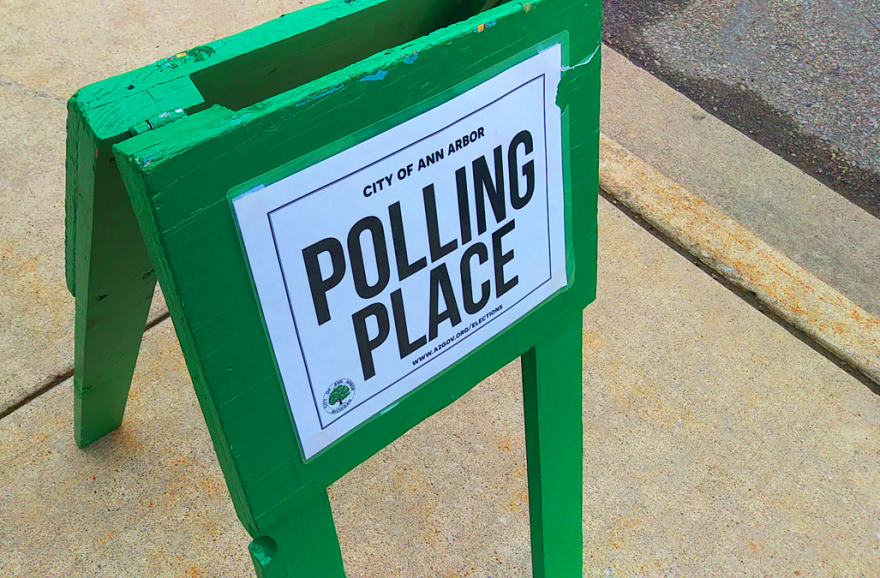Primary elections are Tuesday. And some ballots have proposals that could affect policing in a few Michigan cities, primarily through a city’s charter.
A city charter outlines how local governments are structured and how they function.
In Detroit, residents can vote on Proposal P, which makes sweeping revisions to the current charter in Michigan’s largest city.
Proposal P recently emerged victorious from an intense legal battle Thursday, after the Michigan Supreme Court ruled that Detroiters can, in fact, vote on adopting a new charter.
According to the new charter, some of the new guidelines for the police department, which emphasizes transparency, are:
- Training for non-lethal force training, racial bias training, and de-escalation. Some sessions, including ones at the police academy, will feature people who were impacted by police brutality.
- The Detroit police cannot acquire military equipment “from any federal military equipment program.” Outside of those programs, any acceptance of military-like material or funds that lead to it would need to be done with the approval of the City Council and after a public hearing.
- The Detroit Police Department cannot use “facial recognition technology, video or audio surveillance, cell phone tracking technology, real-time surveillance or other technologies that are intended to surveil citizens.”
- Officers cannot use weapons like teargas on anyone engaged in activities protected by the First Amendment, like protesting.
- Yearly physical and psychological exams for police officers.
- Civilians have the right to record officer’s actions and request “the presence of a supervising officer during police stops or detainment.”
Detroiter Rochella Stewart encouraged people at a city council meeting last week to vote for it.
“Get out and vote for Proposal P. It is the city’s charter. The people’s charter. Get out and vote yes on Proposal P. It’s your duty to this city and the residents,” she said.
[Learn more about Minutes, which is making public meetings more public.]
Over in Dearborn, activists are hoping to open the city’s charter.
A ‘yes’ vote would trigger an election in November for candidates to then serve on a charter revision commission, which would propose changes for residents to vote on.
Right now, the city charter from 2007 requires Dearborn to have at least two police officers per one-thousand residents.
Activists say this prevents the city from spending money on other services, like libraries or sewer infrastructure.
Beth Bailey is with Accountability for Dearborn, a group that formed after George Floyd’s murder by Minneapolis police and focuses on institutional racism and anti-Blackness.
Bailey explains back in the 2010s, the financial crisis made this tension obvious — especially, she adds, during the recent devastating floods in Dearborn.
“The city had to make a lot of tough choices of how it was spending its money. And they could not take money from the police department because of this minimum staffing provision,” she said.
A 2011 Senate Bill prohibits “minimum staffing requirements for city employees.”
A Michigan Radio analysis of general funds found Dearborn spends a lot on police per resident: nearly $514. As a comparison, Detroit, which has eight times the general expenditure, spends $487.
In response, Dearborn’s public director Mary Laundroche wrote in an email in June “(t)he people of Dearborn have said they want a service-driven Police Department, one that is flexible to meet the needs of the day even beyond traditional policing. That desire led to the voter-approved mandatory staffing provision in the City Charter.”
But that provision can be revisited Tuesday. If residents vote yes, the revision process could take two years.
In Pontiac, residents will be voting on if they want to create a charter revision commission to revise its current charter. According to Pontiac’s city clerk in an email, the current charter has not been revised in its entirety since 1982.
However, Pontiac is currently contracted with the Oakland County Sheriff’s Office — its police force disbanded ten years ago to save costs amidst the city’s heavy debts.
Other cities and townships listed below will be voting on the police millage rates, either maintaining or raising it. Some municipalities also include other public safety services like the fire department — which will be detailed on the ballot. (And you can view your ballot early here.)
- Lansing
- Hamtramck (for pensions)
- Ann Arbor Township
- Warren
- Ypsilanti
- Parama Township City and Columbia Township in Jackson County
- Emmet Township in Calhoun County
- Oronoko Township in Berrien County
- Tittabawassee Township in Saginaw County
- Vergennes Township in Kent County
- Shelby Charter Township in Macomb County
- Fruitport Township in Muskegon County
Want to support reporting like this? Consider making a gift to Michigan Radio today.





